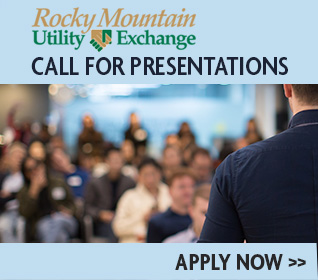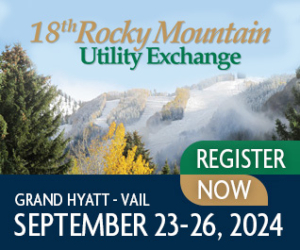The Call for Presentations Closed March 29. The agenda is scheduled to be published at the end of May.
Agenda Format for RMUE
The agenda will explore best practices and lessons learned about initiatives related to energy (gas and electricity) efficiency, water conservation, strategy, issues, and integration with renewable energy, flexible load management, strategic load growth, and other customer-facing initiatives. Share with us how your organization is collaborating with utilities and/or other allies to take a customer-oriented approach to achieve greater impacts in residential, commercial, municipal, and industrial end-use applications.
The agenda format will include 90-minute workshops and sessions, with ample time provided for audience discussion. Current plans are for the agenda to include two workshops, the roundtable, and seven general sessions to be presented over four days. Each session will be facilitated by an Advisory Committee member. The preferred submission is a 20-minute general session presentation followed by 10 minutes of audience Q&A. In-depth, interactive workshop submissions up to 90 minutes may also be proposed. Panel discussion submissions are encouraged.
Selection Process
Preference in the selection process will be given to submissions by Rocky Mountain region utility staff who present case studies that focus on the challenges of designing and implementing comprehensive utility/customer solutions/experiences in ways that demonstrate utility-ally collaboration. Presentations from and about utilities in other geographical regions will be considered if relevant to/replicable in the Rocky Mountain region.
During the agenda development process, the Advisory Committee will rank all submissions and group them by topic. All submitters will be notified of acceptance (or not) prior to agenda publication. Presenters will be required to attend an online coordination meeting/rehearsal and must register to attend the Exchange in-person to confirm their acceptance. Subsequent online coordination meetings and rehearsals with the facilitators and other presenters will be conducted on a session-by-session basis as needed.
Submission Considerations
Presentation submitters are asked to choose the best fit for their submission from the broad topics listed below. When choosing a topic, consider some of these potential themes for how the session facilitator may relate your presentation with the others that will be included in your session for discussion.
Session topics and themes of primary interest to the Advisory Committee are: (these change with consultation of the committee and our own knowledge of what’s happening or hot in the industry each year).
- Federal / State Funding Resources & Partnerships
- Tracking policy changes at the state and federal levels
- Equity and Income-Qualified Program Considerations
- Accessing available funding for utility programs – developing plans, grant writing, administration of funds
- Workforce Development & Engagement
- Service provider recruitment and engagement
- Training and scholarships
- Partnerships with state, federal, local programs
- Utility staff changing skillset needs
- Distributed Energy Resources
- Distributed generation, storage
- Demand response
- DERMS (Demand Energy Resource Management Systems)
- Viewing consumers as resources and partnering with them
- Consumer Engagement
- Communication Strategies and Tactics That Work
- Education outreach and incentives
- How to address Diversity, Equity, Inclusion
- Hard to reach segments such as mobile homes and renters
- Know what level of engagement it takes for each program to be successful
- Commercial Programs
- Building performance standards
- Building and process electrification
- Monitoring based commissioning
- Electrification
- Building electrification
- Transportation electrification
- Utility Stories
- Telling the story in metrics
- Impacts of climate change on utilities
- Evolution of Utility Leadership in Business Models/Markets
- Silo-Busting Collaboration, Innovation Development & Paradigm Shift
- Lessons Learned / Case Studies
- Rate Modernization
- Rate structure vs cost structure
- Meeting consumer and utility needs through rates
- Demand rates
- TOU rates
- Distribution rates
- How met meters affect rate equity
- Load control vs.rate design
- None of the Above: Now for Something Completely Different
- Suggest a topic not mentioned above with a proposed theme
All presenters must agree to the Presenter Policy.



